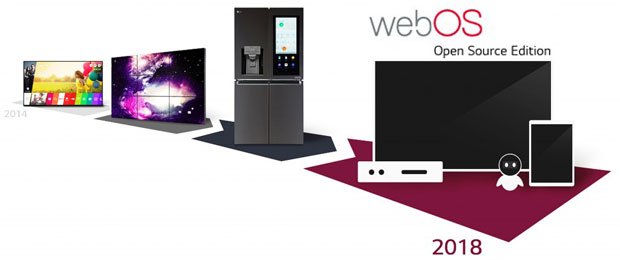[ad_1]
LG on Monday announced a plan to release a new open source version of its webOS platform as part of a deal with South Korea’s government to encourage startup initiatives.
LG entered an agreement with the National IT Industry Promotion Agency — part of the Ministry of Science and ICT (Information and Communication Technology), which is responsible for technology sector development.
LG plans to solicit proposals from hundreds of startups recommended by NIPA and provide logistical and technical support to the most promising candidates. LG will bring the leading contenders to events like the Open Source Summit and OSCON to share ideas.
“When LG adopted webOS for our popular SmartTV lineup in 2013, it did so with the knowledge that webOS had tremendous potential,” said I.P. Park, the company’s chief technology officer.
WebOS has come a long way since then, and it has evolved into a mature and stable OS that can work in a range of devices besides smart TVs.
At CES earlier this year, LG unveiled a new lineup of AI OLED and Super UHD televisions featuring its ThinQ AI and Alpha 9 technologies. The ThinQ integrates the webOS platform with Google Assistant technology.
Google and LG have expanded their efforts to power smart entertainment and smart home devices, including televisions, refrigerators, washing machines, ovens and watches.
They are planning to unveil a jointly developed new smart speaker device later this year.
Third Time Around
LG five years ago acquired the webOS platform from HP — which previously had inherited it from Palm — as part of a strategy to enhance its smart TV products. LG launched a new webOS platform at CES in 2014, as part of a shift toward smart entertainment, making it easier for users to switch between broadcast television and smart TV or connected external devices.
LG later that year released its software developer kit to allow developers to write applications geared for the smart television.
The company then added webOS 3.5 to its OLED and Super UHD televisions, which included Sling TV as part of the Channel Plus streaming video service from XUMO.
Steep Climb
LG will have a tough hill to climb, because it must compete against rival operating systems that have much wider ecosystems and market share advantages with consumers.
“WebOS is a useful platform, but it lacks critical mass,” observed Jim McGregor, principal analyst at Tirias Research.
“App developers only develop for the most popular platforms and may consider porting to other platforms if they see value,” he told LinuxInsider.
OEMs typically either develop their own platform or adopt popular open source solutions, McGregor pointed out, noting that webOS doesn’t have broad enough appeal to fall into either camp.
WebOS had a minimal presence in the smartwatch category, having been used in Watch Urbane LTE, an LG product that never shipped, noted Jitesh Ubrani, senior research analyst at IDC.
LG launched a follow-up to that device but switched to the Android Wear OS, he told LinuxInsider.
The problem with this solution is that there isn’t enough demand when the OS comes directly from a manufacturer, which is why IBM, Palm, HP and others have struggled in the same manner when promoting a proprietary OS, Ubrani explained.
Open sourcing webOS will not solve the problem because in order to be successful the OS would need to be at arm’s length from the company, and it isn’t, he said. “LG, to even get the full benefit themselves, would need a credible developer’s program and likely have to pay a critical mass of developers to build on their own platform.”
[ad_2]
Source link
